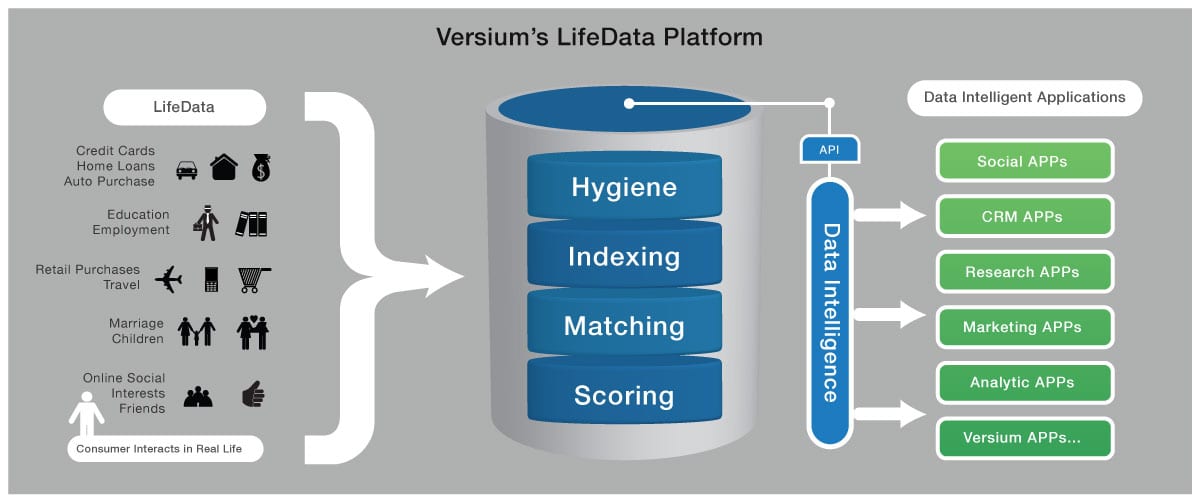There’s a famous cartoon, circa 1990, that depicts two dogs sitting in front of a computer. “On the Internet,” one dog says to the other, “no one can tell you’re a dog!”
 Of course that piece of social humor is only partially true today. Depending on where we cyber-dogs choose to take long walks, dig up bones, or chase sticks and squirells, the data scent that marks the trail of our Web activity can not only sniff out who is a dog but who looks like good dog vs. a bad dog.
Of course that piece of social humor is only partially true today. Depending on where we cyber-dogs choose to take long walks, dig up bones, or chase sticks and squirells, the data scent that marks the trail of our Web activity can not only sniff out who is a dog but who looks like good dog vs. a bad dog.
Seattle’s Versium is emerging as the Internet’s ultimate trailfinder and scorekeeper when it comes to aggregating public data and analyzing through over 40 tell-tale signals. The company is able to advise e-commerce and financial services companies who is a qualified risk and who may be scamming their system.
We got wind of Versium’s new Fraud Score and caught up with CEO Chris Matty to explain how it all adds up.
Seattle24x7: Versium’s LifeData® insights and patent pending identity validation technology is predicting fraud at accuracy rates never before seen using traditional methods.
Chris Matty: Yes, that’s what we’ve trademarked as LifeData®. It is generative data that reflects how a consumer engages with the world. When we look at the available data that encompasses demographics, psychographics, activities and interests, and social graphic details, all of these types of data elements go a long way toward quantifying consumer behavior and how it relates not only to marketing but to other business cases, such as fraud prevention.
Seattle24x7: But it’s more than just the data itself. It’s how you apply it.
Chris Matty: Correct. We apply machine learning and predictive analytics on top of this breadth of data and deploy scores that address different business cases. We have built a library of predictive scores that put machine learning predictive analytic algorithms on top of the Lifedata assets that we own.
Seattle24x7: In a sense you are almost serving as a credit bureau for the validation of online behavior based on these many signals? How would you compare say a score from freecreditreport.com from what you’re doing?
Chris Matty: As far as the comparison, we are unlike a credit bureau in terms of how a bureau functions and what it does in terms of financial related data. We don’t provide services to a consumer. We do provide services to commerce platforms, e-commerce providers, and financial services folks. But when we talk about a predictive score, a score allows a business enterprise to take action on data intelligence, it is somewhat like a credit score since it built around the simple answer to the question, “Will you pay me back?” A high score suggests “yes,” a low score, maybe not.
![]() Our Fraud Score answers the question, “Is somebody trying to scam me?” Our Donor Score asks, “Who’s most likely to raise money or participate in fundraising?” Our Green Score asks, “Is the person environmentally conscious?” So businesses can apply those scores whether for marketing purposes or optimizing consumer engagement, and minimizing fraud.
Our Fraud Score answers the question, “Is somebody trying to scam me?” Our Donor Score asks, “Who’s most likely to raise money or participate in fundraising?” Our Green Score asks, “Is the person environmentally conscious?” So businesses can apply those scores whether for marketing purposes or optimizing consumer engagement, and minimizing fraud.
Seattle24x7: What makes the Versium Fraud Score unique?
Chris Matty: In the case of our Fraud Score, a couple of things make us very unique in the marketplace. One is the predictive accuracy compared to alternatives. It is really tuned to work very well in a new account opening situation. We are able to predict the likelihood of someone having fraudulent intent with as little data as just an email address.
Seattle24x7: How does the email address make that possible?
Chris Matty: If we just have an email address we can leverage our matching technology and get a very strong signal to the validity, based upon online behavioral activities. It will indicate that this is a person behaving normally relative to normal actions online,. Since everybody’s online we can get a great sense that this is a real person with a real intent to do business versus this person is here for the wrong reasons. The more data we can work with, the better. But we don’t necessarily need more than an email address.
Seattle24x7: Then there are people who have multiple email addresses. Is that an issue for you?
Chris Matty: The average person has ten email addresses. In our data store we have four billion email addresses, not all unique, but they have been identified and gathered. So there’s a lot of different data signals we look at to generate a score.
Seattle24x7: The data industry has fallen under considerable scrutiny as a result of the fallout over NSA and PRISM revelations. Where does Versium fit into that discussion?
Chris Matty: All of the signals that we look at are in the public domain. We’re not looking at any private data, only what’s observationally available in the marketplace. When you start putting modeling on top of the volumes of data available, you’re not really disclosing any information that would be sensitive, you’re looking at the end score. Consumers want strong protection from identity theft and other people opening credit cards in their name.
Seattle24x7: Your technology is also predictive, meaning you are focused on identifying risk in advance. Can you detect, say, a stolen credit card, sooner in the process of abuse?
Chris Matty: What often happens when someone has a stolen credit card and wants to buy a bunch of products online is that certain pieces of information are supplied, where the product needs to be delivered, and the time consideration. In terms of fraud prevention, the history has not been predictive but looking backwards based on historical data that has been shared. The past has been a rules based model versus what Versium has developed, which is as a predictive model.
Seattle24x7: What are the categories of businesses that benefit from Versium LifeData and the new Fraud Score?
Chris Matty: We’ve been working with a lot of different folks, very strong brands. Mobile wallets, financial service providers, card issuers. We’ve put a lot of emphasis in the commerce space, whether it’s major e-tailers, or commerce platforms that are looking to build-in major fraud prevention mechanisms,
Anyone selling products online is vulnerable to fraud. What makes our system so helpful is the ability to go upstream and identify potential fraud before a transaction takes place, at the time an account is open. Consumers have to sign-up to receive services and purchase goods. That occurs prior to when a transaction button is hit. We allow our customers to be very proactive before potential damage takes place.
Seattle24x7: Is this scoring system all occurring behind-the-scenes, or might we see a Versium “Fraud Detection” badge or logo on a site to ward people off?
Chris Matty: We’re at the stage of establishing our awareness in the market as a unique approach to preventing fraudulent activity before fraud happens. Once people understand what we’re doing, the possibility of getting a badge is definitely an option.
Seattle24x7: Chris, I’ve read that you have been a victim of identity theft?
Chris Matty: Yes, I was using a monitoring system and got an email saying that someone had tried to open a credit card in my name. Sure enough an application was opened, so I called the bank and had them cancel it. A large amount of information on the application was correct. Ironically, if the company had done a check using our service, our system could have prevented the account from getting even as far as an open application.
Seattle24x7: If you are denied credit, you have to tell them why. Could a company furnish their decline with information provided by your company?
Chris Matty: Yes, if you deny someone credit you have to have a reason. Our system is not being used to approve or deny credit, the credit process of a person going through the application to receive credit, there are a lot of aspects. We are not the decision making process, we simply provide a signal and efficiently reveal what mechanisms can be used if the account is potentially fraudulent. Our system is not being used to grant or approve, it’s really just a data signal that they then use in combination with their normal approval process.
Seattle24x7: Versium is also able to identify attributes that identify donors and benefactors?
Chris Matty: We’re helping enterprises understand their clients better so they can engage in a more successful way for both parties.
Find more information at Versium.com




















